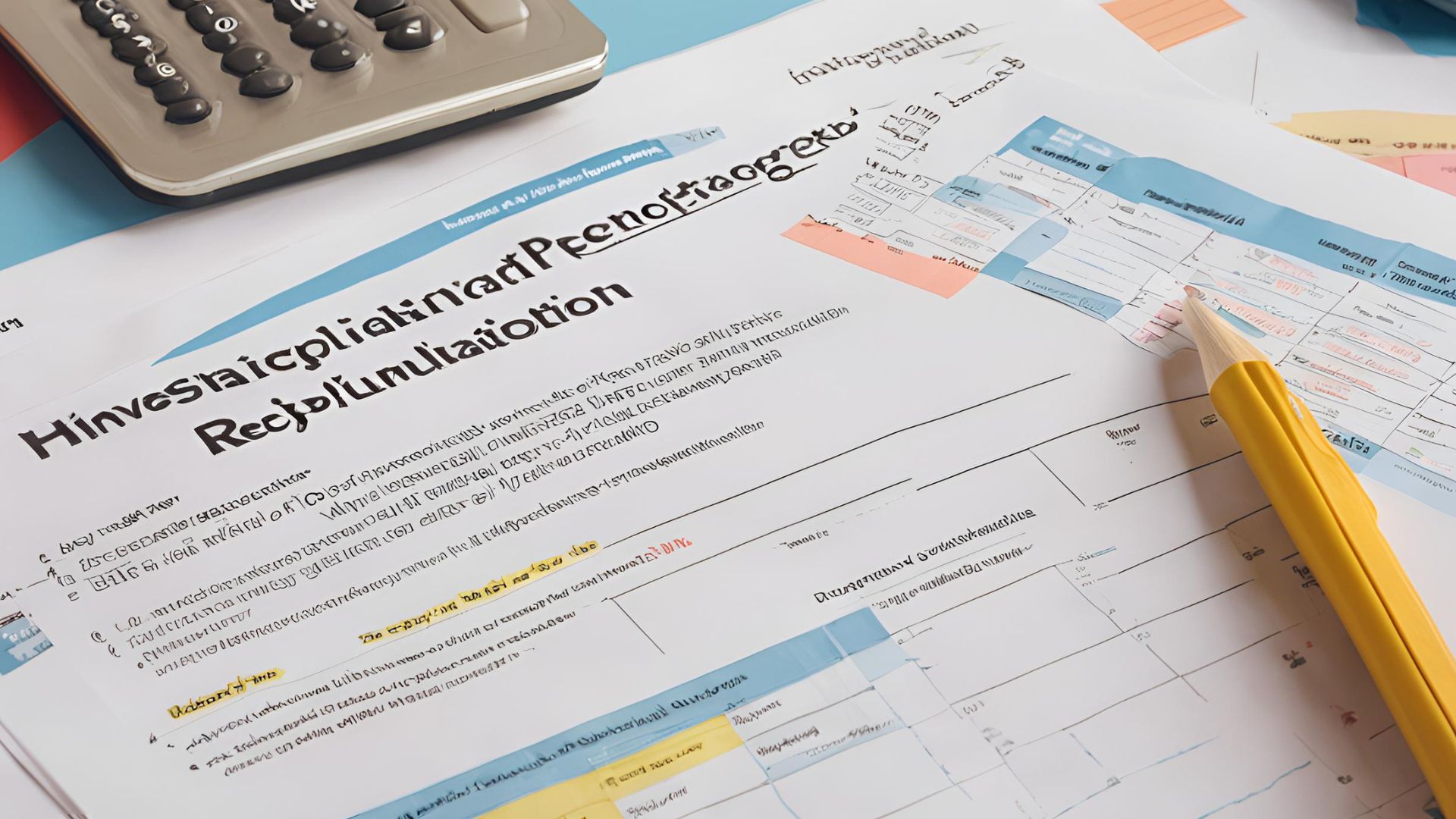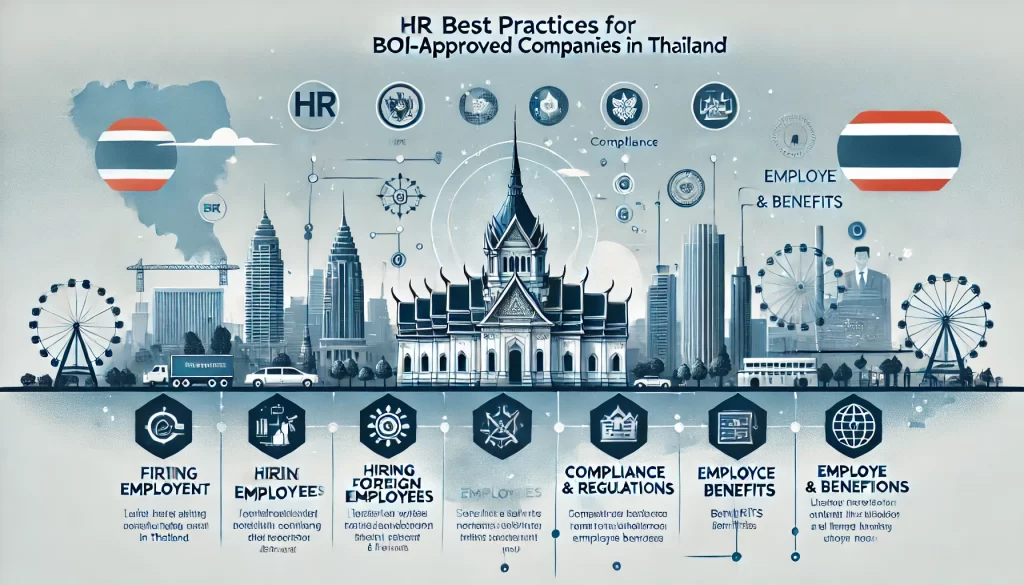Are you struggling to navigate the complex world of HR management in your BOI-approved company in Thailand? 🇹🇭 You’re not alone. Many businesses find themselves overwhelmed by the unique challenges and regulations that come with this special status.
Imagine seamlessly integrating local talent with expatriate expertise, all while staying compliant with BOI regulations. Picture a workplace where employee satisfaction soars, productivity peaks, and turnover rates plummet. This isn’t just a dream – it’s achievable with the right HR practices.
In this comprehensive guide, we’ll explore seven key areas of HR management tailored specifically for BOI-approved companies in Thailand. From understanding complex regulations to implementing cutting-edge HR technologies, we’ll provide you with actionable insights to transform your human resources strategy. Get ready to unlock the full potential of your workforce and drive your business towards unprecedented success in the Thai market. 🚀
Understanding BOI Regulations for HR

A. Key BOI requirements for employment
The Board of Investment (BOI) in Thailand sets specific requirements for employment in approved companies. These requirements are designed to promote local employment and skill development while attracting foreign expertise. Here are the key BOI requirements:
- Minimum Thai-to-foreign employee ratio
- Skill transfer programs
- Hiring of recent graduates
- Mandatory training for Thai employees
| Requirement | Description |
|---|---|
| Thai-to-foreign ratio | Typically 4:1 (may vary by industry) |
| Skill transfer | Structured programs to transfer knowledge |
| Recent graduates | Minimum percentage of new hires |
| Training | Annual training hours for Thai staff |
B. Compliance with labor laws
BOI-approved companies must adhere to Thai labor laws in addition to BOI regulations. This includes:
- Proper employment contracts
- Fair compensation and benefits
- Workplace safety standards
- Non-discrimination policies
C. Reporting obligations
Regular reporting is crucial for maintaining BOI privileges. HR departments must submit:
- Annual employment reports
- Training and development updates
- Skill transfer program outcomes
- Foreign employee work permit status
D. Benefits of BOI approval for HR practices
BOI approval offers several advantages for HR management:
- Easier work permit and visa processes for foreign experts
- Tax incentives for employee training programs
- Support for implementing advanced HR technologies
- Access to BOI-sponsored job fairs and recruitment events
These benefits enable BOI-approved companies to attract top talent and maintain a competitive edge in the Thai labor market. With these regulations and benefits in mind, let’s explore effective recruitment strategies for BOI companies in Thailand.
Recruitment Strategies for BOI Companies

A. Attracting skilled local talent
To attract top-tier local talent, BOI-approved companies in Thailand must implement innovative recruitment strategies:
- Develop a strong employer brand
- Offer competitive compensation packages
- Provide career growth opportunities
- Emphasize work-life balance initiatives
Creating a positive company culture and showcasing it through various channels can significantly boost your attractiveness to skilled local professionals.
B. Navigating foreign worker quotas
BOI-approved companies must carefully manage their foreign worker quotas:
| Quota Type | Description | Considerations |
|---|---|---|
| BOI Quota | Based on registered capital | Can be increased with justification |
| Non-BOI Quota | 1 foreigner per 4 Thai employees | Limited to 10 work permits |
Strategically allocate quotas to key positions and consider alternatives like hiring Thai nationals or using outsourcing services for non-critical roles.
C. Implementing fair hiring processes
Ensure your hiring practices are transparent and non-discriminatory:
- Develop clear job descriptions and qualification criteria
- Use structured interview techniques
- Implement blind resume screening
- Conduct regular diversity and inclusion training for hiring managers
These practices not only promote fairness but also help in attracting a diverse talent pool.
D. Utilizing government incentives for recruitment
BOI-approved companies can leverage various government incentives to enhance their recruitment efforts:
- Tax deductions for employee training expenses
- Visa and work permit facilitation for foreign experts
- Grants for R&D projects that create high-skilled jobs
- Support for internship programs with local universities
By effectively utilizing these incentives, companies can attract and retain top talent while reducing recruitment costs.
Now that we’ve explored effective recruitment strategies, let’s delve into the crucial aspect of training and development programs for your workforce.
Training and Development Programs

A. Meeting BOI skill development requirements
To comply with BOI regulations, companies must prioritize skill development for their workforce. The BOI typically requires:
- Annual training hours per employee
- Specific training areas relevant to the industry
- Documentation of training activities
Here’s a breakdown of common BOI skill development requirements:
| Requirement | Description |
|---|---|
| Training Hours | Minimum 6-12 hours per employee annually |
| Training Areas | Technical skills, soft skills, language proficiency |
| Documentation | Detailed training records, certificates, assessments |
B. Implementing effective training initiatives
Successful training programs for BOI-approved companies should:
- Align with business objectives and BOI requirements
- Utilize diverse learning methods (e.g., workshops, e-learning, mentoring)
- Incorporate both internal and external expertise
- Address skill gaps identified through regular assessments
C. Fostering a culture of continuous learning
To create a learning-oriented environment:
- Encourage knowledge sharing among employees
- Provide access to learning resources (e.g., online courses, libraries)
- Recognize and reward learning achievements
- Integrate learning into performance evaluations
D. Leveraging technology for employee development
Embrace digital tools to enhance training effectiveness:
- Learning Management Systems (LMS) for course delivery and tracking
- Virtual Reality (VR) for immersive skill practice
- Mobile learning apps for on-the-go development
- AI-powered personalized learning paths
E. Measuring training outcomes
Evaluate the impact of training programs through:
- Pre and post-training assessments
- Employee feedback surveys
- Performance improvements in relevant KPIs
- Return on Investment (ROI) calculations
By focusing on these aspects, BOI-approved companies can develop robust training and development programs that meet regulatory requirements while fostering a skilled and motivated workforce.
Compensation and Benefits

A. Competitive salary structures
Establishing competitive salary structures is crucial for BOI-approved companies in Thailand to attract and retain top talent. To achieve this, consider the following strategies:
- Conduct regular market research
- Implement a clear job grading system
- Develop salary bands for each job grade
- Offer competitive base salaries
- Include performance-based bonuses
| Job Grade | Salary Range (THB/month) | Experience Level |
|---|---|---|
| Entry | 20,000 – 30,000 | 0-2 years |
| Mid-level | 30,000 – 60,000 | 3-5 years |
| Senior | 60,000 – 100,000 | 6+ years |
| Executive | 100,000+ | 10+ years |
B. Tax-efficient benefit packages
Designing tax-efficient benefit packages can help maximize employee compensation while minimizing tax liabilities. Some tax-efficient benefits for BOI companies in Thailand include:
- Provident funds
- Health insurance
- Housing allowances
- Transportation allowances
- Education subsidies for dependents
C. Performance-based incentives
Implementing performance-based incentives can motivate employees and drive productivity. Consider the following types of incentives:
- Annual bonuses based on individual and company performance
- Stock options or profit-sharing plans
- Sales commissions for relevant roles
- Project completion bonuses
- Long-term incentive plans for key employees
D. Compliance with minimum wage regulations
BOI-approved companies must ensure compliance with Thailand’s minimum wage regulations. As of 2023, the minimum wage varies by province, ranging from 328 to 354 baht per day. Regularly review and adjust salary structures to remain compliant with these regulations.
Now that we’ve covered compensation and benefits, let’s explore strategies for maintaining positive employee relations and improving retention rates in BOI-approved companies.
Employee Relations and Retention

Creating a positive work environment
A positive work environment is crucial for employee retention in BOI-approved companies in Thailand. To achieve this, consider implementing the following strategies:
- Foster open communication
- Recognize and reward employee achievements
- Promote work-life balance
- Encourage teamwork and collaboration
- Provide comfortable and modern workspaces
| Aspect | Impact on Employee Retention |
|---|---|
| Open communication | Increases trust and engagement |
| Recognition | Boosts morale and motivation |
| Work-life balance | Reduces burnout and improves satisfaction |
| Teamwork | Enhances job satisfaction and productivity |
| Workspace quality | Improves overall well-being and performance |
Addressing cultural diversity
In Thailand’s multicultural business environment, addressing diversity is essential. Implement these practices:
- Provide cross-cultural training
- Celebrate diverse cultural holidays
- Encourage multilingual communication
- Establish diversity and inclusion committees
- Offer culturally sensitive benefits packages
Implementing effective communication channels
Effective communication is vital for employee relations. Consider these channels:
- Regular team meetings
- Company-wide newsletters
- Intranet portals
- Anonymous feedback systems
- Social media platforms for internal communication
Developing career progression pathways
To retain top talent, create clear career progression opportunities:
- Establish mentorship programs
- Offer skill-based training and development
- Implement performance-based promotions
- Provide cross-departmental exposure
- Support continuing education initiatives
Conducting regular employee satisfaction surveys
Regular surveys help gauge employee sentiment and identify areas for improvement. Key aspects to cover include:
- Job satisfaction
- Work-life balance
- Leadership effectiveness
- Company culture
- Career growth opportunities
Use the survey results to implement targeted improvements and demonstrate your commitment to employee well-being.
HR Technology and Innovation

Streamlining HR processes with software solutions
In today’s digital age, BOI-approved companies in Thailand can significantly enhance their HR operations by adopting cutting-edge software solutions. These tools automate routine tasks, allowing HR professionals to focus on strategic initiatives.
Key HR software solutions:
- Applicant Tracking Systems (ATS)
- Employee Self-Service portals
- Performance Management platforms
- Time and Attendance tracking
Ensuring data privacy and security
With the increasing reliance on digital tools, data protection becomes paramount. BOI companies must implement robust security measures to safeguard sensitive employee information.
| Security Measure | Purpose |
|---|---|
| Encryption | Protect data during transmission |
| Access controls | Limit data access to authorized personnel |
| Regular audits | Identify and address vulnerabilities |
| Employee training | Raise awareness about data security |
Leveraging analytics for strategic decision-making
HR analytics empower BOI companies to make data-driven decisions, improving overall organizational performance.
Benefits of HR analytics:
- Identify trends in employee turnover
- Optimize recruitment processes
- Predict future workforce needs
- Measure the effectiveness of training programs
Adopting AI-driven HR tools
Artificial Intelligence is revolutionizing HR practices, offering unprecedented efficiency and insights.
AI applications in HR:
- Chatbots for employee queries
- Resume screening and candidate matching
- Predictive analytics for employee retention
- Personalized learning recommendations
By embracing these technological advancements, BOI-approved companies in Thailand can create a more efficient, data-driven HR function that supports overall business objectives. Next, we’ll explore the unique challenges and strategies for managing expatriate employees in BOI companies.
Managing Expatriate Employees

Visa and work permit assistance
For BOI-approved companies in Thailand, managing expatriate employees begins with efficient visa and work permit processes. These companies often benefit from streamlined procedures, but it’s crucial to stay updated on regulations.
Key steps for visa and work permit assistance:
- Pre-arrival documentation
- BOI promotion certificate submission
- Non-immigrant B visa application
- Work permit processing
- 90-day reporting compliance
| Document | Processing Time | Validity |
|---|---|---|
| BOI Certificate | 2-4 weeks | Project duration |
| Non-B Visa | 3-5 working days | 90 days |
| Work Permit | 7-10 working days | 1-2 years |
Cultural integration programs
Successful expatriate management goes beyond paperwork. Implementing robust cultural integration programs is vital for employee satisfaction and productivity.
Effective cultural integration strategies:
- Thai language courses
- Cross-cultural communication workshops
- Local customs and etiquette training
- Mentorship programs pairing expats with local employees
Expatriate compensation packages
BOI companies must offer competitive expatriate packages to attract top talent. These packages typically include:
- Base salary (often tax-equalized)
- Housing allowance
- Education allowance for dependents
- Home leave travel benefits
- Health insurance coverage
Repatriation support
As expatriate assignments conclude, providing comprehensive repatriation support ensures a smooth transition. This support should cover:
- Career planning for post-assignment roles
- Reverse culture shock management
- Relocation assistance
- Financial planning and tax considerations
By implementing these strategies, BOI-approved companies in Thailand can effectively manage their expatriate workforce, ensuring compliance, cultural integration, and employee satisfaction throughout the assignment lifecycle.
Implementing effective HR practices is crucial for BOI-approved companies in Thailand to attract, develop, and retain top talent while complying with local regulations. By focusing on strategic recruitment, comprehensive training programs, competitive compensation packages, and strong employee relations, these companies can create a thriving work environment that supports both local and expatriate employees.
As the business landscape continues to evolve, BOI-approved companies must stay ahead of the curve by embracing HR technology and innovation. By leveraging these tools and consistently refining their HR strategies, organizations can build a robust workforce that drives success and contributes to Thailand’s economic growth. Remember, investing in human capital is not just a requirement for BOI compliance—it’s a key driver of long-term business success in the competitive Thai market.

